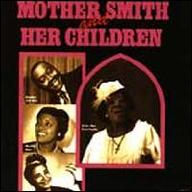Debuting at the National Baptist Convention in 1922, the Fords created a sensation with their performances of Ezekiel Saw the Wheel and I'm in His Care. After her sisters married and quit the group, Smith mounted a solo career; a high soprano, she briefly flirted with pursuing classical music, but was so profoundly moved by Detroit's Madame Artelia Hutchins' performance at the 1926 Baptist Convention that she returned to gospel once and for all. Upon marrying a man who operated a general hauling business, Smith began touring to supplement their household income; with the exception of the legendary Sallie Martin, she was arguably the first gospel performer to tour relentlessly, conducting musical revivals in many of the cities she visited. In her travels Smith crossed paths with Thomas A. Dorsey, who in 1932 invited her to Chicago to help organize the National Convention of Gospel Choirs and Choruses. She later formed a St. Louis chapter, and was the longtime head of the soloists' bureau.
Smith's rendition of her own composition If You Just Keep Still, delivered at the 1937 National Baptist Convention, set a new standard for solo singing; just as influential was her skill as an arranger, with her radical reinterpretations of chestnuts like Jesus Loves Me, Throw Out the Lifeline, and What a Friend We Have in Jesus galvanizing a new generation of singers to include the songs in their repertoires. As a teacher, Smith also mentored Brother Joe May, Myrtle Scott, Edna Gallmon Cooke, and Martha Bass. She joined the Church of God Apostolic in 1939, and immediately her music reflected the rhythm and energy of the sanctified church; still, she did not finally begin recording until the end of the following decade -- with her protégé May enjoying massive success with her style, she saw no point in entering the studio. Only a handful of Smith recordings were issued in her own lifetime, and by the early '50s, she had turned to evangelical work; still, she continued to remain a great inspiration, dying on February 2, 1994. ~ Jason Ankeny, Rovi












